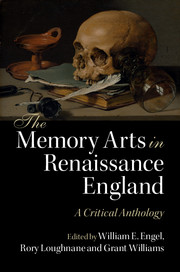Book contents
- Frontmatter
- Dedication
- Contents
- List of figures
- Acknowledgements
- A note on abbreviations
- Introduction
- PART I The art of memory
- PART II Rhetoric and poetics
- PART III Education and science
- PART IV History and philosophy
- PART V Religion and devotion
- Introduction to Part V
- V.1 Thomas More, A Treatise (Unfinished) upon these Words of Holy Scripture (1522)
- V.2 John Foxe, Acts and Monuments (1563)
- V.3 Thomas Playfere, The Pathway to Perfection (1593)
- V.4 Joseph Hall, selected works
- V.5 Richard Day, A Book of Christian Prayers (1608)
- V.6 Daniel Featley, ‘Four Rows of Precious Stones’ (1610)
- V.7 Lewis Bayly, The Practice of Piety (1613)
- V.8 John Donne, ‘Sermon, preached at Lincoln's Inn’ (1649)
- V.9 Stephen Jerome, A Minister's Mite (1650)
- V.10 E.M., Ashrea (1665)
- PART VI Literature
- Index
- References
V.5 - Richard Day, A Book of Christian Prayers (1608)
from PART V - Religion and devotion
Published online by Cambridge University Press: 05 August 2016
- Frontmatter
- Dedication
- Contents
- List of figures
- Acknowledgements
- A note on abbreviations
- Introduction
- PART I The art of memory
- PART II Rhetoric and poetics
- PART III Education and science
- PART IV History and philosophy
- PART V Religion and devotion
- Introduction to Part V
- V.1 Thomas More, A Treatise (Unfinished) upon these Words of Holy Scripture (1522)
- V.2 John Foxe, Acts and Monuments (1563)
- V.3 Thomas Playfere, The Pathway to Perfection (1593)
- V.4 Joseph Hall, selected works
- V.5 Richard Day, A Book of Christian Prayers (1608)
- V.6 Daniel Featley, ‘Four Rows of Precious Stones’ (1610)
- V.7 Lewis Bayly, The Practice of Piety (1613)
- V.8 John Donne, ‘Sermon, preached at Lincoln's Inn’ (1649)
- V.9 Stephen Jerome, A Minister's Mite (1650)
- V.10 E.M., Ashrea (1665)
- PART VI Literature
- Index
- References
Summary
About the author
Richard Day (1552–1606), London printer, assisted his father, John Day, in producing works of reformed religious interest, most notably the third edition of Foxe's Acts and Monuments (V.2). He became co-patent holder of his father's stock (including the enormously influential Psalms in Metre and The ABC with the Little Catechism).
About the text
Responding to the demand for new books of devotion for daily and domestic use occasioned by the reintroduction of the Book of Common Prayer, John Day printed Christian Prayers and Meditations in 1569, the first of many editions. Although the prayers are consistent with the reformed practices, the visual layout makes the work something of a Protestant ‘Book of Hours’. Instead of an illustration of the Virgin Mary opening the work (as with earlier Catholic Horae), Queen Elizabeth is shown at her private devotion. This, coupled with her having owned a copy (now in the Lambeth Palace Library), gave rise to calling it ‘Queen Elizabeth's Prayer Book’.
Although there is some variation in the incidental decorative ornaments, every edition from 1578 to 1608 retains the same distinctive border illustrations. Seven sequences constitute the overarching iconographic programme: the life of Christ; personifications of twenty-two Christian virtues; vignettes of the six acts of corporal mercy (Matt. 25); allegories of the senses with biblical mottoes; the Apocalypse; the Dance of Death; and, finally, the ‘four last things’ of Christian eschatology – death, judgement, hell and heaven.
The arts of memory
The pictorial elements use many aspects of the traditional art of memory, especially as the images are arranged in designated sequences that establish a continuous visual narrative, in effect furnishing a mnemonic itinerary. As the pictures have no direct or intended correspondence to the prayers on the page, the visual programme creates a book within the book that serves as a devotional guide in its own right. The work draws on the medieval Book of Hours and Biblia pauperum (though neither a bible nor for the poor; in fact, some extant copies are so lavishly coloured as to be considered de luxe artefacts). The latter was a picture book pairing Old and New Testament scenes to show how past events divinely foreshadowed future ones.
- Type
- Chapter
- Information
- The Memory Arts in Renaissance EnglandA Critical Anthology, pp. 246 - 254Publisher: Cambridge University PressPrint publication year: 2016



